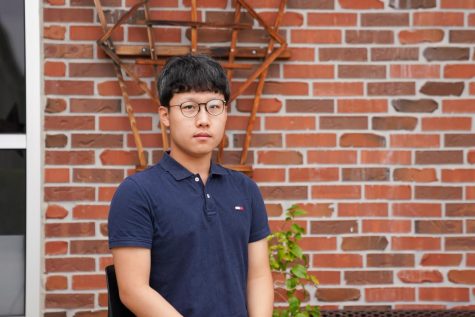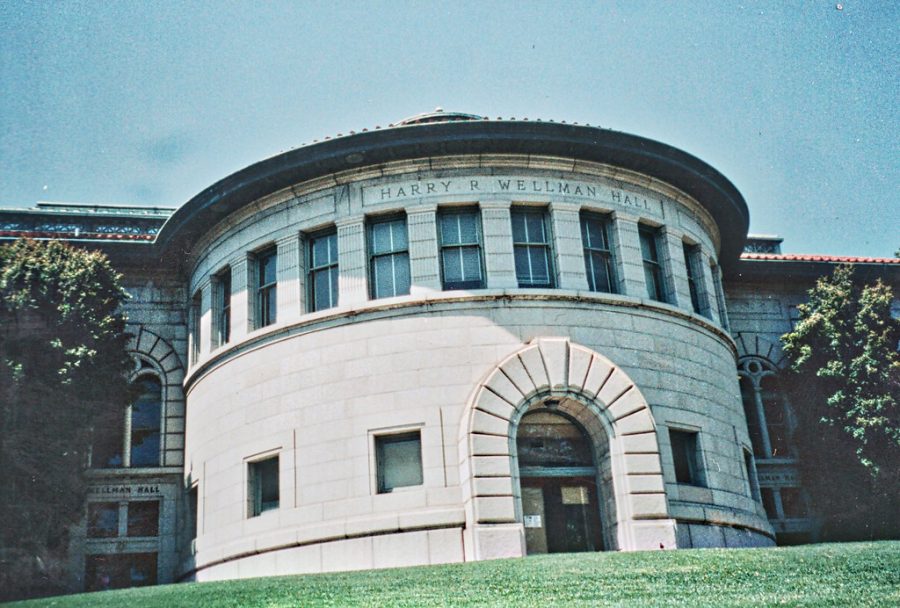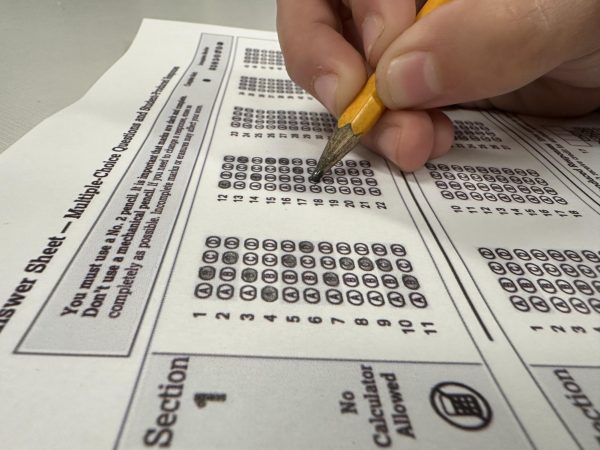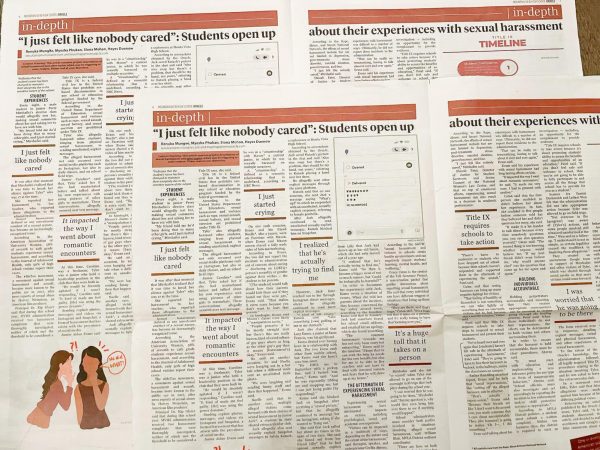Impact of Affirmative Action on Asian Americans
How affirmative action affects Asian Americans in college applications
During the 1960s, Americans demanded an increase of opportunities for minority races and genders due to the rising number of immigrants and increasing discrimination against certain races. In 1965, according to the American Association for Access, Equity and Diversity (AAAED), a policy was made to expand the number of Black, Latinxs, and Native American people in colleges and career fields. This policy would later be coined by president Lyndon Johnson as affirmative action.
According to HG Legal Resources, the main objective of affirmative action was to remedy past discrimination against races such as Black and Latinx Americans. Companies and industries in the United States were encouraged to employ people without considering their race, gender or background. While affirmative action was mainly applied to businesses when the policy was first established, The New Yorker states that the focus of affirmative action shifted towards the field of education in the early 21st century.
According to the Association of American Colleges and Universities (AAC&U), affirmative action has helped increase the number of Black students and Latinx students that are accepted into college. Research done by the AAC&U shows that starting from the 1990s, there was nearly a 10% rise in the number of Black students that got admitted into the top 20 universities in the United States. Private counselor Nancy Kim, who has helped with college applications in academies for more than ten years, believes that affirmative action is restoring the right of minority races to pursue education without discrimination.
“African American men have been pushed down in society for too long,” Kim said. “If you were treated unequally for many generations under systemic abuse, you need help to climb out of the hole of hurt and resentment. So I believe that it is only right for the government to give them that kind of opportunity.”
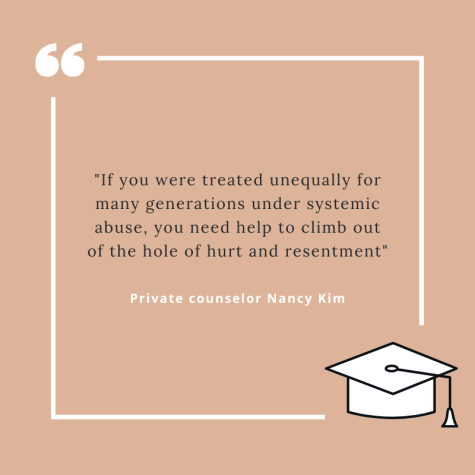
Kim also states that affirmative action will make the United States a better place to live and offer more opportunities to minority races. She believes that affirmative action is a policy that benefits the country as a whole, not only certain races.
“I feel we need to look at affirmative action selflessly and as a bigger picture,” Kim said. “Affirmative action will be positive for our society because it will make our country more equal and help level the playing field for minority races. If American society becomes more equal, that is a positive thing even for races that do not benefit from affirmative action. ”
However, some may question the effectiveness of affirmative action due to recent statistics regarding college enrollment. The University of California (UC) released data showing that in 1996, Black students made up 6.2% of the high school student population in the United States, and 3.7% of them enrolled in colleges. While the number of college-enrolled Black students increased by 0.2% in 2019, the Black high school student population also increased by 0.3%. Thus, the ratio of college-enrolled Black students to the Black high school student population showed no significant change since 1996, staying the same at approximately 0.6%. Thomas Campbell, a former dean at the School of Business at UC Berkeley, expresses doubt towards affirmative action.
“Affirmative action gives preference on the basis of race,” Campbell said. “But the percentage of African Americans and Latinos in any universities in California has not gone up. The universities of California should judge applicants on their individual records, not on their race.”
Furthermore, the New York Times states that affirmative action has created racial and ethical issues in the college applications process. While affirmative action gives racial minorities such as Black and Hispanic students a bump in college enrollments, other races are negatively affected, one of them being Asian Amercians. Campbell believes that affirmative action is an unnecessary policy that simply harms the chances of certain students because of their race.
“Affirmative action targets Asian Americans,” Campbell said. “If affirmative action is adopted, there is no doubt that admissions to universities in California will, at the margin, be taken away from an Asian American in order to give it to a student of a different race. But nobody should be denied admission to the UC system because of their race.”
According to a study done by Princeton University in 2009, Asian Americans applicants’ SAT scores had to be 140 points higher than White students, 270 points higher than Hispanic students, and 450 points higher than Black students in order to be admitted to top universities. Sophomore Jerry Hu expresses his increasing distaste towards affirmative action due to the rising standards of Asian Americans in college applications.
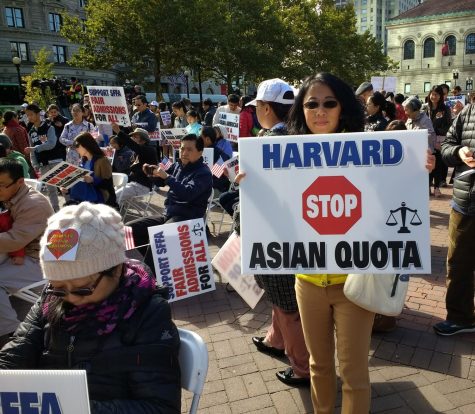
“I’m quite disappointed at colleges that use affirmative action for not choosing the people who actually try hard,” Hu said. “I know that other races also try hard, but I’m just worried that colleges are not choosing the best examples or the best people to get into their schools.”
In addition, the Washington Post stated that grouping Asian Americans together in the process of college applications might harm low-income Asian Americans. The Washington Post showed that some Asian immigrants such as the Chinese Hmongs lack proper education and income, but are still grouped under Asian Americans in colleges that use affirmative action. Kim expresses her concerns about lumping all Asian Americans as a whole.
“Affirmative action does bring equality to our country, but I do not think that the Asian community should be grouped as wholesale,” Kim said. “There are Asian Americans who are wealthy, but there are also Asian Americans who do not have the ability to rise above and really belong in the category of affirmative action.”
Campbell believes that the issue of affirmative action has risen to the surface again due to Proposition 16. According to Ballotpedia, California citizens will be able to vote for 12 propositions that will appear on the ballot along with the vote for Presidential candidates. Proposition 16 covers the issue of affirmative action and the government’s ability to discriminate against or grant preferential treatment to certain races or genders. If the proposition passes, all Californian colleges will be allowed to use affirmative action in their college application process. Campbell, however, believes that universities in California have other ways to recruit minority students.
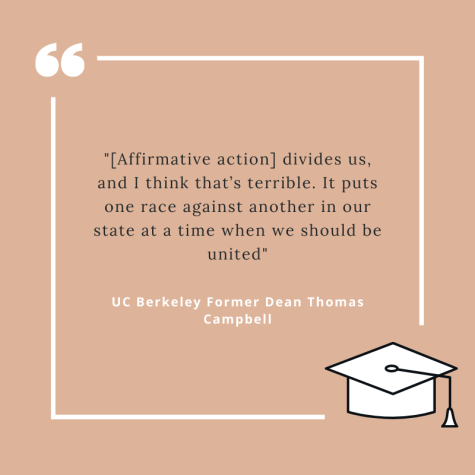
“We ought to put our effort into helping students who do not come to the University of California applications well-prepared,” Campbell said. “That’s because they are at high schools that are not as good. It is true that those underperforming high schools are often associated with high percentages of African American and Latino students. Therefore, we must do a better job of high school education. We can also send out student ambassadors to encourage Latino or African American students to apply.”
Campbell states that due to current major racial movements, equality and opportunities among races are becoming an important problem that the United States needs to solve. In the midst of racial change, Campbell believes that affirmative action is a policy that has room for improvement.
“Affirmative action divides us, and I think that’s terrible,” Campbell said. “It puts one race against another in our state at a time when we should be united. There are many problems in the education field that we need to devote our resources to, but don’t do it on the basis of race. Do it on the basis of students who are not given the opportunities.”
